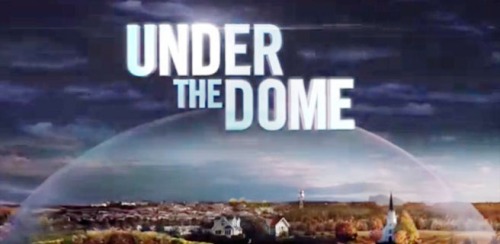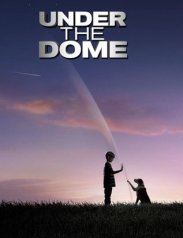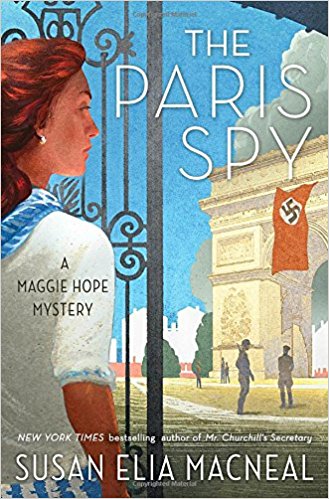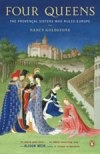 “The dead also do not see, unless they look from a brighter place
“The dead also do not see, unless they look from a brighter place
than this darkling plain where ignorant armies clash by night.”
These words leapt off page 439 of Stephen King’s Under the Dome, as they are almost an exact quote from Matthew Arnold’s poem Dover Beach (see below). In that poem, Arnold is standing on the shale of the beach looking out at the light of the moon as it reflects across the English Channel and on the distant coast of France.
Similarly, the residents of Chester’s Mill are gazing up at the stars which have been distorted by the haze of the Dome, giving them a pink, streaked appearance, as if the stars are raining down upon them. In both instances, celestial phenomena prompt an observation on how small, and somewhat insignificant, people are compared to the greater world at large.
Arnold’s poem deals with a crisis of faith, and King’s narrator also seems to have lost faith in the society under the Dome. The Dover Beach quote is followed by a list of those who have died since the mysterious barrier came down, and then (spoiler alert!) cuts to the town’s first Dome-driven suicide.
Arnold seems to be searching for faith in human intimacy (“ah, love, let us be true to one another!”) despite a melancholy world that “hath really neither joy, nor love, nor light.” The people in Chester’s Mill appear to personify and magnify this outlook on humanity. Those who connect and support each other eventually become the only ones who have a chance. (A bit like “live together, die alone” from LOST—a quote which I kept expecting to appear in this book.) Dover Beach hints at dystopia and then King brings this to fruition Under the Dome.
The ‘darkling plain’ is also a loaded reference to Shakespeare’s King Lear, Act I Scene 4. Arnold certainly understood this, and I feel that King too is alluding to the Fool’s observation: “We were left darkling.”
The Fool has realized that Goneril is betraying her father, though Lear can’t bring himself to accept this, asking “Are you our daughter?” This is the moment when Lear begins to question his new situation and his new reality—the moment which ultimately kicks off his descent into madness and rage. Like Lear, the people of Chester’s Mill are going to face new unhinged reality and widespread madness.
 Dover Beach must be a favorite of King’s as he also references it in The Shining. Jack wanders around the Colorado Lounge thinking what it must have been like there celebrating there in 1945, “the war won, the future stretching ahead so various and new, like a land of dreams.” Here King is juxtaposing this hopefulness against Jack’s own Lear-like descent into madness.
Dover Beach must be a favorite of King’s as he also references it in The Shining. Jack wanders around the Colorado Lounge thinking what it must have been like there celebrating there in 1945, “the war won, the future stretching ahead so various and new, like a land of dreams.” Here King is juxtaposing this hopefulness against Jack’s own Lear-like descent into madness.
Finally, it must be noted that in Fahrenheit 451 by Ray Bradbury, Dover Beach is the poem that Guy Montag reads aloud in a desperate attempt to reach out to his wife and her friends. King was an unabashed fan of Bradbury’s, having stated “without Ray Bradbury, there would be no Stephen King.”
Dover Beach has long been one of my favorite poems for its complex tension of hope and despair—also the words are beautiful. It’s thrilling to think after more than a century, nearly two, a Victorian poet (who ironically was known for his concept of “sweetness and light”) could exact such an influence on writers like Stephen King and Ray Bradbury.
Dover Beach by Matthew Arnold
The sea is calm to-night.
The tide is full, the moon lies fair
Upon the straits;–on the French coast the light
Gleams and is gone; the cliffs of England stand,
Glimmering and vast, out in the tranquil bay.
Come to the window, sweet is the night-air!
Only, from the long line of spray
Where the sea meets the moon-blanch’d land,
Listen! you hear the grating roar
Of pebbles which the waves draw back, and fling,
At their return, up the high strand,
Begin, and cease, and then again begin,
With tremulous cadence slow, and bring
The eternal note of sadness in.
Sophocles long ago
Heard it on the Aegean, and it brought
Into his mind the turbid ebb and flow
Of human misery; we
Find also in the sound a thought,
Hearing it by this distant northern sea.
The Sea of Faith
Was once, too, at the full, and round earth’s shore
Lay like the folds of a bright girdle furl’d.
But now I only hear
Its melancholy, long, withdrawing roar,
Retreating, to the breath
Of the night-wind, down the vast edges drear
And naked shingles of the world.
Ah, love, let us be true
To one another! for the world, which seems
To lie before us like a land of dreams,
So various, so beautiful, so new,
Hath really neither joy, nor love, nor light,
Nor certitude, nor peace, nor help for pain;
And we are here as on a darkling plain;
Swept with confused alarms of struggle and flight,
Where ignorant armies clash by night.
Under the Dome Update: Left Hanging
I’m Going Under the Dome for a Summer Readalong!
Check Out WordHits on Facebook
 Mann Gulch, Storm King Mountain, and now, Yarnell Hill. Oh, it was awful to learn about
Mann Gulch, Storm King Mountain, and now, Yarnell Hill. Oh, it was awful to learn about 



 From the first pages of Stephen King’s
From the first pages of Stephen King’s  I also jumped each time Lissa the librarian fiddled with her ankh necklace (p. 430). The Egyptian ankh (known as
I also jumped each time Lissa the librarian fiddled with her ankh necklace (p. 430). The Egyptian ankh (known as  Hopefully, King, Vaughn, and Bender will ultimately follow King’s own advice. Meanwhile, there were approximately 500 pages cut from the original draft of the novel, so there are plenty of new story lines to explore.
Hopefully, King, Vaughn, and Bender will ultimately follow King’s own advice. Meanwhile, there were approximately 500 pages cut from the original draft of the novel, so there are plenty of new story lines to explore.




